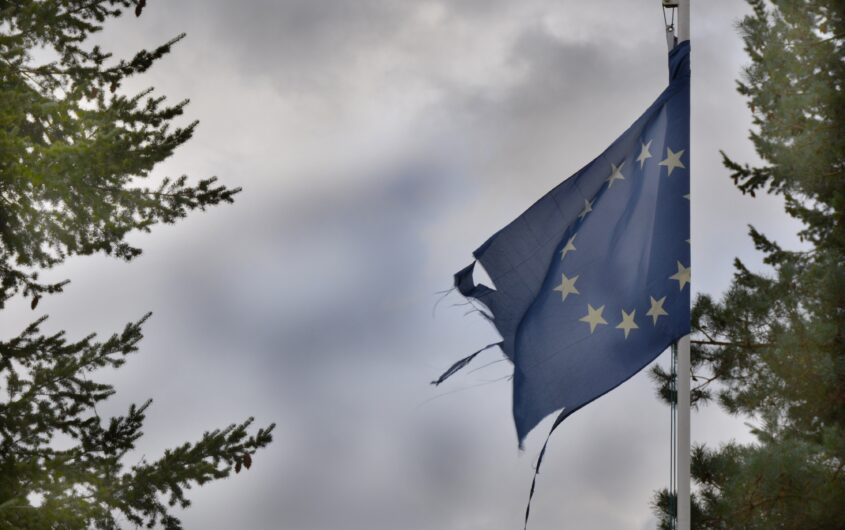
Gambling Europe’s Future

Alexander Privitera
AGI Non-Resident Senior Fellow
Alexander Privitera a Geoeconomics Non-Resident Senior Fellow at AGI. He is a columnist at BRINK news and professor at Marconi University. He was previously Senior Policy Advisor at the European Banking Federation and was the head of European affairs at Commerzbank AG. He focuses primarily on Germany’s European policies and their impact on relations between the United States and Europe. Previously, Mr. Privitera was the Washington-based correspondent for the leading German news channel, N24. As a journalist, over the past two decades he has been posted to Berlin, Bonn, Brussels, and Rome. Mr. Privitera was born in Rome, Italy, and holds a degree in Political Science (International Relations and Economics) from La Sapienza University in Rome.
Overcome by a bout of despair, the French president confided to one of his closest advisers that “this is a country which is disintegrating, and I can do nothing about it. How can one stop a country disintegrating if that is what its people want to do?” The president was Charles de Gaulle, his grip on power slipping away from him in 1968, challenged by social unrest. Watching the current leader of France Emmanuel Macron looking a bit lost among his fellow G7 colleagues in a luxurious southern Italian resort in June 2024, one could not help but imagine similar thoughts haunting him after his decision to call snap parliamentary elections. So far, the me-or-chaos scare tactics deployed with bravado by Macron only seem to have backfired. His centrist party is trailing in all polls, squeezed by the right and the left. The vote could even produce an outright far-right majority or, perhaps more likely, a hung parliament. For now, a sudden resurgence of Macron’s own party “Renaissance” appears to be the most unlikely outcome. If things stay this way, the polls will produce an outright rejection of Macron and his reforms, which in recent years had also contributed to making France more attractive for international investors, most notably after the decision by the UK in 2016 to leave the European Union.
Investors are taking note and have sent the French stock market as well as the country’s sovereign bonds, known as OATs, tumbling. The spread between the yields of French bonds and their German peers has climbed to levels not seen since the Great Financial Crisis of 2008. But so far, the contagion risk appears to be limited, as the conflicting narratives of “this will be contained” and “this could open the door to a new euro crisis” have largely balanced each other out. The European Central Bank assures there is currently no need to discuss interventions on its part to compress yields and support sovereign bonds of vulnerable euro area countries, which for the first time since the common currency was introduced, now include France. But there is little room for complacency. Markets will remain on edge until a new political landscape has emerged.
Macron was of course not the only big loser that emerged from the recent European election. The other was Olaf Scholz, the German chancellor and head of a now profoundly unpopular, weak, and perhaps increasingly incompatible coalition of Social Democrats, Greens, and Free Democrats. Scholz’s response to the gallic boldness displayed by his French counterpart was to resort to his customary incrementalism. His message was “let us govern and voters will learn to appreciate what we are doing.” But his party is facing another possible wipeout in three key state elections in Germany’s former East this autumn. If Macron’s gamble can look to outside observers as potentially suicidal, Scholz’s instinctive, somewhat Merkelian attempt at relying on caution and a wait-and-see approach has a similarly reckless feel.
The domestic political weaknesses in France and Germany thus deepen the sense that there is a void in the heart of Europe.
It is of little comfort that the political crisis in both countries has accelerated the appointment of the new EU’s top jobs, making a reconfirmation of the current Commission’s president Ursula von der Leyen in her position all but certain, and had a negligible impact on the distribution of power in the European Parliament. All in all, the center managed to well defend its predominant position. However, the EP is not yet a credible counterweight to other key European institutions such as the Commission and, most importantly, the European Council, made of heads of state and government of member states. In the current institutional balance of power, it is impossible to imagine a political alliance of the Commission and Parliament acting without the endorsement or against the will of member states. The domestic political weaknesses in France and Germany thus deepen the sense that there is a void in the heart of Europe, with potential implications not only for the support to Ukraine, but also for the bloc’s approach to its climate policies, China, trade, and Europe’s future economic agenda. There are already some troubling signs that Germany may have started to focus on purely domestic short-term priorities. A new round of European sanctions that in part aims at reducing indirect EU exports to Russia through third countries was recently blocked by Germany in Brussels. The decision makes Berlin look as if it was trying to shield and support its export-oriented small and medium sized manufacturers even if it means condoning exports to Russia that occur in a legal grey area. Even the famed Zeitenwende, the epochal pivot aimed at revamping Germany’s defense preparedness, was recently dismissed by one of the main German arms manufacturers as good talk followed by too little action.
If Europe can no longer rely on France and Germany to deliver common strategic impulses for its future, this would seem to be a historic chance for others to step up and play a greater role. But who? Italy? Its leader Giorgia Meloni is still too ambivalent about Europe and her country is simply saddled with too much public debt to credibly play that role. She has accepted Europe as a necessity but has so far shown little enthusiasm for grand schemes aimed at strengthening Europe’s strategic autonomy. Poland, perhaps with support from Baltic states? Spain? The Nordics? All alternatives to the Franco-German duo still seem far-fetched and unable to deliver coherent ideas needed for a shared agenda. Of course, all this would matter less if the United States, the ultimate protector of European security for over 70 years, remained fully committed to the continent. But there is no longer any certainty that will be the case in the future.
Thus, voters in France could deal a blow to Europe that would resonate for years. Perhaps Macron dared to challenge the French people because he felt encouraged by history. After all, even the Maastricht treaty that established the European common currency was narrowly endorsed by the French in 1992 after a vicious domestic campaign against it. Earlier in history, after his conversation with his advisor laced with gloomy hopelessness, the father of the Fifth Republic, Charles de Gaulle, packed a suitcase and made a secret trip to Germany. He came back with the decision to let the French people speak and in 1968 managed to win the legislative elections in a landslide. The crisis was defused, but eleven months later, he was out of power.







